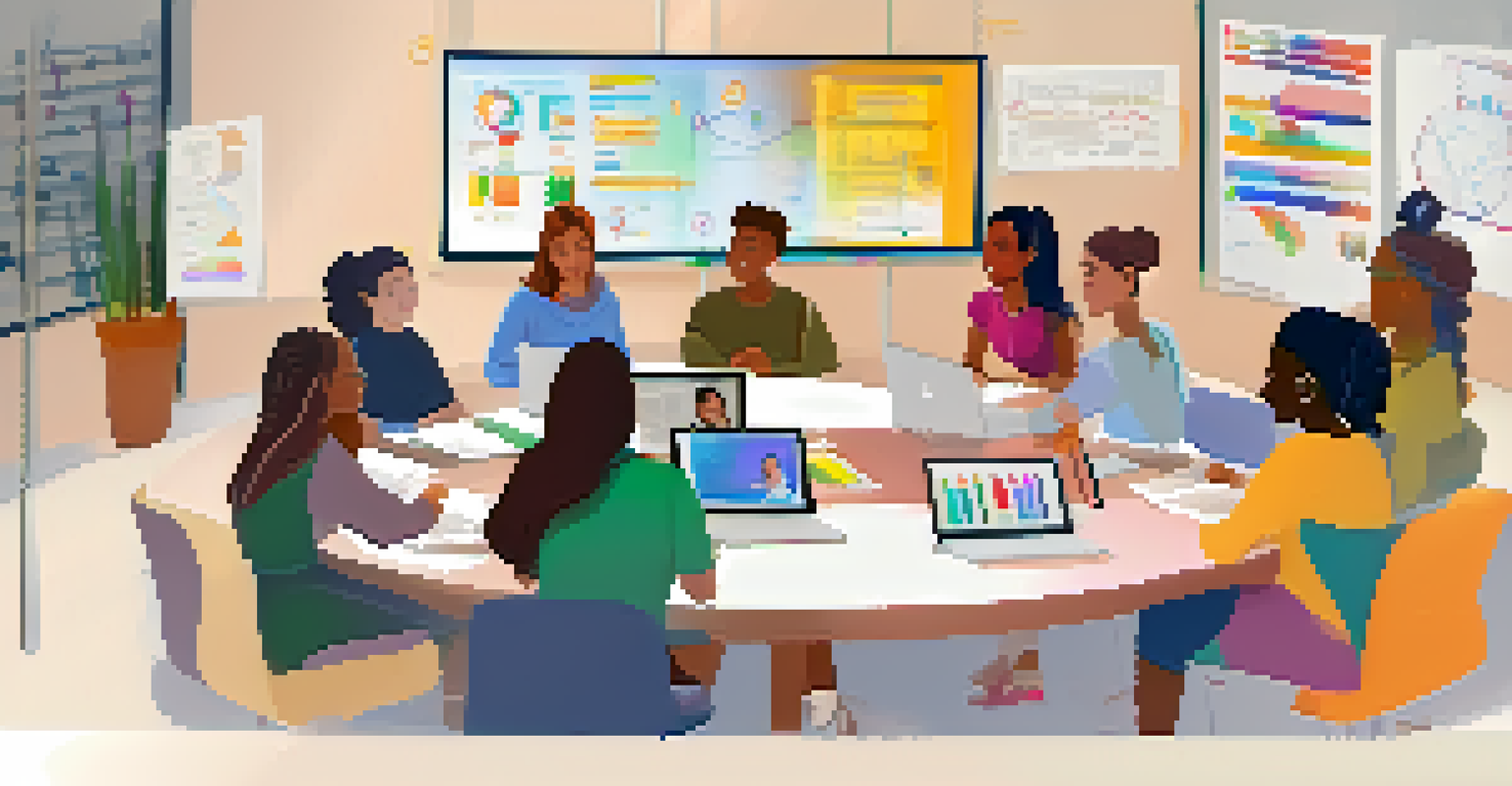Leveraging Online Courses to Develop Technical Skills

Understanding the Importance of Technical Skills Today
In today's fast-paced digital landscape, technical skills are more crucial than ever. Companies are increasingly looking for employees who can navigate technology with ease, making these skills a significant asset in any career. Whether you're in marketing, finance, or engineering, having a solid technical foundation can set you apart from your peers.
In a world where knowledge is being updated every second, the only way to stay relevant is to keep learning.
Think of technical skills as the building blocks of your professional toolkit. Just like a mechanic needs tools to fix a car, professionals in various fields require technical know-how to solve problems and innovate. This relevance spans across industries, underlining the need to continuously develop these skills to remain competitive.
Moreover, the rapid evolution of technology means that what you know today might not be enough tomorrow. By investing time in online courses, you can keep your skills updated and relevant, ensuring you’re always equipped to tackle new challenges.
The Rise of Online Learning Platforms
Online learning platforms have revolutionized how we acquire new skills. With an array of options like Coursera, Udemy, and LinkedIn Learning, you can choose courses that fit your schedule, interests, and goals. This flexibility allows you to learn at your own pace, making it easier to balance education with work and personal commitments.

These platforms also provide access to industry experts and specialized content that might not be available locally. Imagine having a seasoned software developer as your instructor; the insights and knowledge they share can significantly enhance your learning experience. Plus, many courses offer hands-on projects, ensuring you apply what you learn in real-world scenarios.
Technical Skills Are Essential
In today's digital world, having strong technical skills can significantly enhance your career prospects across various industries.
Additionally, the community aspect of online learning shouldn't be overlooked. Engaging with fellow learners can lead to networking opportunities and collaborative projects, enriching your educational journey and expanding your professional circle.
Choosing the Right Course for Your Goals
When it comes to selecting an online course, it's essential to align your choices with your career aspirations. Start by identifying the specific technical skills you want to develop. For instance, if you're interested in data analysis, look for courses focusing on tools like Excel or SQL, as opposed to graphic design courses that won't advance those skills.
An investment in knowledge always pays the best interest.
Consider the course format as well. Some learners thrive in structured environments with deadlines, while others prefer self-paced options. Many platforms offer previews of their courses, so take advantage of these to find a teaching style that resonates with you. Reading reviews can also provide valuable insights into the course's effectiveness.
Remember, your goal is not just to complete a course but to gain applicable skills. After choosing a course, set clear objectives for what you aim to achieve, and stay committed to your learning journey.
Maximizing Your Learning Experience
To truly benefit from online courses, it's vital to adopt effective study habits. Create a dedicated learning environment where distractions are minimized, allowing you to focus fully on the material. Treat your online classes as seriously as you would an in-person workshop, setting aside specific times for study and practice.
Engagement is key; don't just passively watch videos. Take notes, participate in discussion forums, and seek clarification on concepts that confuse you. Engaging with the content actively helps reinforce your understanding and retention of the material.
Online Learning Offers Flexibility
Platforms like Coursera and Udemy provide flexible, accessible learning options, allowing you to acquire new skills at your own pace.
Lastly, practice is essential. If you learn a new programming language, for example, try building a small project to apply your knowledge. This hands-on experience solidifies what you've learned and prepares you to use those skills in real-world situations.
Building a Portfolio to Showcase Your Skills
As you complete online courses, consider creating a portfolio to showcase your new skills. A portfolio is like a digital resume that highlights your projects, achievements, and the skills you've acquired. This is especially important in technical fields, where potential employers appreciate seeing tangible proof of your abilities.
You can include various types of work, such as code snippets, design projects, or data analysis reports. Make sure to explain each project, detailing your role and the technologies you used. This not only demonstrates your technical skills but also your ability to communicate effectively.
Remember, a well-curated portfolio can be a powerful asset during job interviews. It gives you the opportunity to discuss your projects and the thought processes behind them, making you more memorable to potential employers.
Networking Opportunities Through Online Learning
One often-overlooked benefit of online courses is the networking potential they offer. Engaging with instructors and fellow students can lead to valuable professional connections. Many platforms provide discussion forums and networking events, creating a community of like-minded learners who can support each other's growth.
Participating actively in these communities can open doors to collaborations, mentorships, or even job opportunities. As you learn alongside others in your field, you’ll find people who share your interests and goals, making it easier to build relationships that could advance your career.
Networking Enhances Learning
Engaging with instructors and peers during online courses can lead to valuable professional connections and opportunities.
Additionally, consider reaching out to instructors or industry professionals you meet during your courses. Sending a polite message expressing your appreciation for their work or asking for advice can lead to meaningful conversations that may benefit your career path.
Staying Motivated on Your Learning Journey
Online learning can sometimes feel isolating, making it crucial to stay motivated throughout your educational journey. Setting small, achievable goals can help maintain your enthusiasm. Celebrate milestones, whether it's completing a module or finishing a project; these wins can keep your spirits high.
Joining study groups or online communities can also combat feelings of isolation. Sharing your progress with peers and discussing challenges can provide encouragement and accountability. Plus, learning from others’ experiences can deepen your understanding and spark new ideas.

Lastly, remind yourself of the bigger picture. Keeping your long-term career goals in mind can provide the motivation needed to push through challenging topics. Whether it’s landing a new job or earning a promotion, focusing on your aspirations can make the effort feel worthwhile.